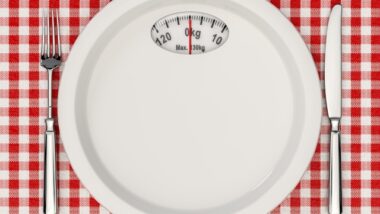Weight not decreasing can result from a plateau, where the body adapts to current routines. It may also be due to hidden calories in your diet.
Struggling with weight loss can be frustrating. Many experience a plateau when their bodies adapt to their exercise and diet regimen. This adaptation can slow down or halt progress. Hidden calories in seemingly healthy foods could also be a culprit.
Small, frequent indulgences add up quickly, undermining efforts. Hormonal imbalances, stress, and lack of sleep can further complicate weight loss. Monitoring these factors and adjusting your routine can help overcome these obstacles. Accurate tracking, diversified workouts, and a balanced diet are essential. Consulting with a healthcare professional can provide personalized insights.
Common Myths
Understanding why weight isn’t decreasing can be confusing. Many people fall for common myths that hinder progress. Let’s explore some of these myths and uncover the truth.
Debunking Diet Trends
Many diet trends promise quick results. They often fail to deliver long-term benefits. Here are some popular myths about diets:
- Fad Diets: These often restrict essential nutrients. They can cause nutrient deficiencies.
- Skipping Meals: This slows down metabolism. It can lead to overeating later.
- Detox Diets: The body naturally detoxifies itself. Extreme detox diets can be harmful.
Misconceptions About Exercise
Exercise plays a crucial role in weight loss. Misunderstandings about exercise can prevent progress. Consider these myths about exercise:
- Spot Reduction: You can’t lose fat in just one area. Full-body exercises are more effective.
- More Exercise, Faster Results: Overtraining can lead to injuries. Balance is key.
- Cardio is Best: Strength training is also vital. It helps build muscle and boosts metabolism.
Understanding these myths helps create realistic expectations. Focus on balanced diets and consistent exercise. This approach leads to sustainable weight loss.
Dietary Pitfalls
Struggling with weight loss can be frustrating. Even with a strict diet, weight might not decrease. Common dietary pitfalls can sabotage your progress. Let’s explore some.
Hidden Calories
Hidden calories lurk in many foods. They can quickly add up. These calories often come from sauces, dressings, and beverages.
- Sugary drinks like soda and flavored coffee
- Salad dressings and dips
- Condiments like ketchup and mayonnaise
Check food labels for serving sizes. Small portions can contain many calories. Be mindful of what you consume.
Inadequate Protein Intake
Protein is crucial for weight loss. It helps build muscle and keeps you full. Many people do not get enough protein.
| Food | Protein per Serving |
|---|---|
| Chicken breast | 31g |
| Greek yogurt | 10g |
| Egg | 6g |
Adding protein-rich foods can help. Include lean meats, legumes, and dairy. Aim for a balanced diet.
Exercise Errors
Struggling to lose weight despite regular exercise? You might be making exercise errors. Simple mistakes can hinder your progress. Let’s explore these common exercise errors and how to fix them.
Overtraining
Overtraining can stall weight loss. Your body needs rest to recover. Exercising too much can lead to fatigue and injury.
Signs of overtraining include:
- Constant tiredness
- Decreased performance
- Frequent injuries
To avoid overtraining, follow these tips:
- Schedule rest days
- Listen to your body
- Get enough sleep
Lack Of Variety
Doing the same workout every day can be a mistake. Your body adapts to repetitive exercises, leading to plateaus.
Benefits of varying your workouts:
- Prevents boredom
- Engages different muscle groups
- Improves overall fitness
Here are ways to add variety:
- Mix cardio with strength training
- Try new activities like yoga or swimming
- Change your workout routine every few weeks
By correcting these exercise errors, you can boost your weight loss journey. Remember, balance and variety are key to effective workouts.

Credit: www.healthline.com
Lifestyle Factors
Struggling to see the scale move? Lifestyle factors might be the hidden culprit. Addressing these factors can bring significant changes to your weight loss journey.
Sleep Deprivation
Sleep deprivation can wreak havoc on your weight loss efforts. When you don’t get enough sleep, your body produces more of the hunger hormone, ghrelin. This increases your appetite and cravings for unhealthy foods.
On the flip side, lack of sleep decreases the production of leptin, the hormone that signals fullness. This imbalance can lead to overeating and weight gain.
Here are some tips to improve your sleep:
- Maintain a consistent sleep schedule.
- Avoid caffeine and heavy meals before bedtime.
- Create a calming bedtime routine.
Stress Levels
High stress levels can also hinder weight loss. Stress triggers the release of cortisol, a hormone that increases appetite and fat storage.
Chronic stress can lead to emotional eating, where you turn to food for comfort. This often results in consuming high-calorie, sugary foods.
To manage stress effectively, consider the following strategies:
- Practice mindfulness and meditation.
- Engage in regular physical activity.
- Connect with friends and family for support.
Addressing these lifestyle factors can help you get back on track. Focus on improving sleep and managing stress for better weight loss results.
Medical Conditions
Struggling with weight loss despite a healthy lifestyle? Medical conditions could be the culprit. Understanding these conditions is crucial for effective weight management.
Thyroid Issues
The thyroid gland controls metabolism. Hypothyroidism means an underactive thyroid, slowing down metabolism. This can make it hard to lose weight. Common symptoms include fatigue, feeling cold, and constipation. A blood test can diagnose thyroid issues. Treatment often involves medication to regulate hormone levels.
Hormonal Imbalances
Hormones play a key role in weight management. Imbalances can lead to weight gain. Polycystic Ovary Syndrome (PCOS) is a common hormonal disorder. Women with PCOS may find it harder to lose weight. Symptoms include irregular periods, acne, and hair growth. Insulin resistance is another concern. It can cause weight gain and make losing weight difficult. Proper diagnosis and treatment are essential for managing hormonal imbalances.
Mental Barriers
Weight loss is more than just diet and exercise. Mental barriers can significantly impact your progress. Addressing these barriers is crucial for achieving and maintaining your weight loss goals.
Emotional Eating
Emotional eating occurs when you eat to cope with feelings. Common triggers include stress, sadness, or boredom. This type of eating leads to consuming extra calories.
- Identify your triggers.
- Keep a food diary.
- Find healthier ways to manage emotions.
Replace emotional eating with activities like walking or talking to a friend. These methods help manage emotions without adding calories.
Lack Of Motivation
A lack of motivation can hinder your weight loss journey. Staying motivated requires setting clear and achievable goals.
- Set small, realistic goals.
- Track your progress.
- Reward yourself for milestones.
Joining a support group can also boost motivation. Sharing your journey with others provides accountability and encouragement.
Mental barriers like emotional eating and lack of motivation are common. Addressing these can significantly impact your weight loss success.
Tracking Mistakes
Tracking your food and exercise is essential for weight loss. But mistakes happen. These mistakes can stop your progress. Below are common tracking mistakes and how to avoid them.
Inaccurate Logging
Many people log their food incorrectly. You might miss some items. Or, you might guess the quantity. Both can lead to errors.
Here are some common mistakes:
- Not logging small snacks.
- Guessing portion sizes.
- Forgetting to log drinks.
Use a food scale to measure portions. This helps keep your logs accurate.
Ignoring Portion Sizes
Portion sizes matter a lot. You might eat more than you think. This can lead to weight gain.
Consider these tips:
- Measure your food with a scale or cups.
- Read food labels for serving sizes.
- Be mindful of restaurant portions.
Here is a simple table to help you:
| Food Item | Recommended Portion |
|---|---|
| Rice | 1 cup cooked |
| Chicken Breast | 3 oz cooked |
| Broccoli | 1 cup chopped |
Stick to these portions to stay on track.

Credit: www.medanta.org
Effective Strategies
Struggling to lose weight can be frustrating. Sometimes, the scale just won’t budge. This can be disheartening. But don’t worry. There are effective strategies to help you. Let’s explore some key methods that can make a big difference.
Balanced Nutrition
A balanced diet is crucial for weight loss. It ensures your body gets all the nutrients it needs. Here’s a simple guide:
- Fruits and Vegetables: Eat a variety of colors every day.
- Lean Proteins: Chicken, fish, and beans are excellent choices.
- Whole Grains: Opt for brown rice, whole-wheat bread, and oats.
- Healthy Fats: Include avocados, nuts, and olive oil.
Avoid processed foods and sugary drinks. Drink plenty of water. Eating smaller, frequent meals can also help. This keeps your metabolism active.
Consistent Exercise Routine
Exercise is a key part of any weight loss plan. Consistency is more important than intensity. Here are some effective exercises:
| Exercise | Duration | Frequency |
|---|---|---|
| Walking | 30 minutes | 5 days a week |
| Strength Training | 45 minutes | 3 days a week |
| Yoga | 20 minutes | Daily |
Mixing up your routine can keep things interesting. Try different activities like swimming or cycling. This can help you stay motivated.
Remember, small, consistent efforts lead to big changes over time.
:max_bytes(150000):strip_icc()/Health-GettyImages-1368554196-c285c1ac05034052b04149b68d38c2ae.jpg)
Credit: www.health.com
Frequently Asked Questions
Why My Weight Is Not Going Down?
Your weight may not be dropping due to factors like poor diet, lack of exercise, stress, or medical conditions. Ensure balanced meals, regular workouts, and proper sleep. Consult a doctor for persistent issues.
Why Is Weight Not Reducing Even After Exercise And Diet?
Weight might not reduce due to factors like stress, sleep issues, muscle gain, or underlying medical conditions. Track your progress.
Why Am I Not Losing Weight Despite Eating Less?
You might not be losing weight due to factors like slow metabolism, lack of exercise, or hormonal imbalances. Stress and poor sleep can also hinder weight loss. Ensure you’re eating nutritious foods and staying hydrated. Consider consulting a healthcare professional for personalized advice.
What Causes A Person Not To Lose Weight?
Poor diet, lack of exercise, hormonal imbalances, sleep deprivation, and stress can prevent weight loss. Medications and medical conditions might also contribute.
Conclusion
Understanding why your weight isn’t decreasing can be challenging. Evaluate your diet, exercise, and lifestyle habits. Small changes might yield significant results. Stay patient, consistent, and consult professionals if needed. Remember, weight loss is a journey, not a race. Prioritize health over quick fixes for sustainable success.


